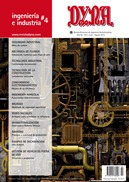LATEST TRENDS IN HUMAN ACTIVITY MODELLING
Keywords:
modelado de actividades, reconocimiento de actividades, monitorización de actividades, basado en el conocimiento, basado en datos, activity modelling, activity recognition, activity monitoring, knowledge-driven, data-drivenAbstract
ABSTRACT: Human activity modelling is a key step for any activity recognition system. By means of activity modelling, the meaningful ways that activities are being performed by humans are computationally modelled. Activity models are not only indispensable for activity recognition, but they can also be used for some other applications, such as human behaviour understanding and cognitive disease diagnosis and evolution. Despite the significance of activity modelling, a complete review of different approaches cannot be found in the literature. In this paper, the focus has been set on modelling approaches, distinguishing between knowledge-driven and data-driven activity modelling. The first approach uses prior domain knowledge to build activity models using knowledge engineering and management tools. On the other hand, the second approach aims at learning activity models directly from user generated data using machine learning and data mining techniques. Recently, modelling approaches that fuse knowledge- and data-driven techniques have appeared. They try to combine the best features of both approaches, opening new research lines. The most relevant hybrid approaches are introduced in this paper. Finally, open research problems and potential future work are analysed, in order to provide a guide to those researchers who would like to contribute to acitivity modelling. Key Words: activity modelling, activity recognition, activity monitoring, knowledge-driven, data-drivenDownloads
Published
2015-07-01
Issue
Section
ARTICULOS

